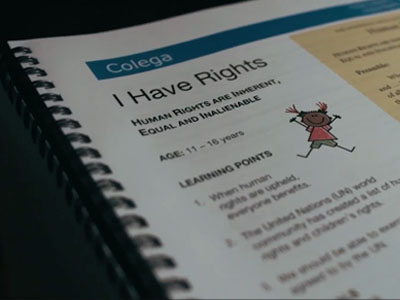Students Help With the Improvement of Colega

Colega - An Interactive Curriculum to Teach Children About Human Rights
Dr. Nick Eastmond, USU Emeritus Professor for the Instructional Technology and Learning Sciences department, gave an ITLS class the opportunity to help with the improvement of the Philippines’ nation-wide educational program for teaching human rights.
Since April of 2019, Dr. Eastmond has been busy volunteering for the Geneva Organization for Human Right Education (GO-HRE) where he learned about Colega, an educational curriculum created to better inform children from around the world about human rights.
Colega was named after the Spanish word meaning “colleague” or “friend” as the primary purpose of this program is to help every student treat others as friends despite differences they may have. The program has two separate guides, one for children from the ages of 6 to 10, and another for youth aged 11 to 16, totaling 20 lessons. Each lesson is an hour long and teaches aspects of human rights through songs, creative games, interactive activities and discussions, and stories about love, kindness, and equality. The teachers conclude by extending invitations to the children to share what they learned with their family, friends, and even neighbors. They also invite the children to look for ways to apply what they learned to their own personal lives.
GO-HRE had been working on Colega for several years, and by the time Dr. Eastmond joined their team, they had already distributed the program throughout Brazil, Mozambique, and the Philippines. Though the program had been slowly spreading, one of Professor Eastmond’s responsibilities was to help accelerate this process, specifically in the Philippines. Just the year before, GO-HRE spent two weeks in the Philippines presenting their program in several conferences to teachers and government officials. Before long, Colega was approved as part of the country's official school curriculum. When Dr. Eastmond began in April 2019, Colega had already been implemented in several private schools in Manilla.
At the end of last year, GO-HRE collected data and made observations about the progress of their program in the Philippines. Using that data and collaborating with some of the country’s official government representatives, they were able to make Colega even more versatile and enjoyable for the students. They divided lessons in half to better adapt to school schedules. The Philippine officials specifically asked GO-HRE to create a visual aid for the teachers by putting each lesson into a PowerPoint presentation. With this new project at hand, Dr. Eastmond began his search for talented people that could help.
As a professor, Dr. Eastmond had always looked for opportunities for his students to work on projects that contributed towards a greater cause. He heard that ITLS instructor and PhD student Roxie Christensen and her class might be interested, and he presented GO-HRE’s mission and new project to her class. The class was enthusiastic about helping Dr. Eastmond and his team.
The students faced many challenges as they worked on creating PowerPoint presentations for Colega’s forty lessons. Although they had to work remotely because of the closures due to the coronavirus pandemic, Roxie Christensen and her class were able to successfully complete the project. “These are all really talented people and they were fun to work with,” said Dr. Eastmond. He also praised the major effort to accomplish the task during COVID-19 conditions.
GO-HRE reported that Colega had reached about 610,000 children in its first year. With the implementation of this new program in the Philippines’ school curriculum, it’s estimated to reach five million children at the end of this year and over 23 million children in two more years. Thanks to the help of USU faculty, students, and alumni, millions of students will learn about human rights.
To learn more about Colega, visit go-hre.org.

